Working directories
10 Best Audio Editors For Linux in 2021 (Free & Paid)
Edit the music files effectively on your Linux system.
Megan LeaveyApril 15, 2020
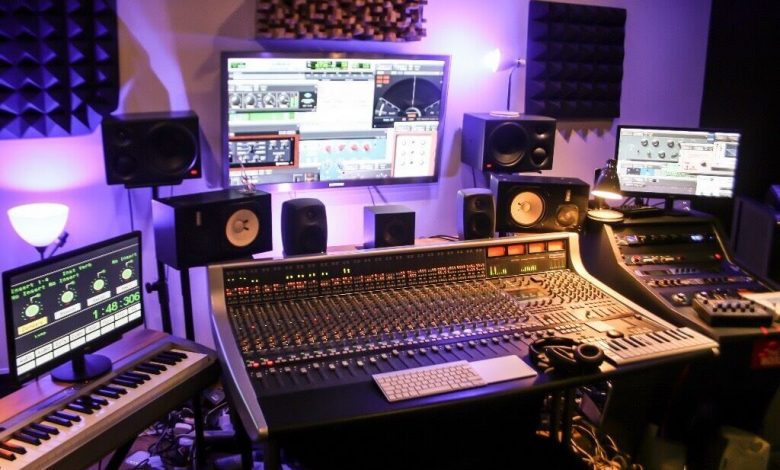
Audio Editors For Linux
Music is the best painkiller in the world. But at the same time, it is not that easy to create music. It takes a lot of patience to finetune it. Either for professional graders or newbies, you need audio editors to polish your music. If you are a Linux user and you are in the search of the best audio editor software for Linux OS, you are in the correct place. In this article, we have listed for you the best audio editors for Linux.
List of Best Audio Editors For Linux
- Audacity
- LMMS
- Mixxx
- Virtual DJ
- Qtractor
- Ardour
- guitarix
- Ocenaudio
- Hydrogen Drum Machine
- Rosegarden
Audacity
Audacity is inarguably the best audio editor for Linux OS. It is one of the most popular audio editors among the Linux users.
Copy video URL
Copy video URL at current time
Fullscreen


IMA SDK can’t be loaded
![]()
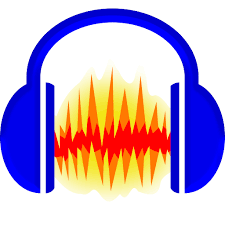
Audacity is an open-source cross-platform audio software. With Audacity, you can record live audio, computer playback, edit any music formats like WAV, FLAC, Ogg Vorbis, MP2, MP3, AIFF, and more. The supported sound qualities are 16-bit, 24-bit, and 32-bit. In addition to that, you can add extra plug-ins like LV2, LADSPA, VST, and more. Audacity provides a wide range of keyboard shortcuts so that you won’t need to use your mouse.
Audacity is available for free and it is available for Windows and Mac too.
LMMS
LMMS (Linux Multimedia Studio) is one of the powerful digital audio workstations.

The LMMS has all the basic audio editing features with some advanced editing tools. It has the most user-friendly interface. With LMMS, you can mix sounds, create sounds using VST, built-in compressor and audio presets. It is developed by music professionals, so you will get the real feel of music editing in this software. For music professionals, it has the spectrum analyzer for advanced audio editing.
LMMS is available for free and it consumes only 89.3 MB of your storage.
Mixxx
Mixxx, the name itself tells that the software is dedicated for audio editors alone.

If you want to have some DJ, Mixxx is the best option. It has all the tools that every DJ needs. With the Mixxx, you can perform live mixes in your own creative way. It will let you know the BPM (Beats per minute) and musical key so that you will mix the next track perfectly. Mixx allows you to add multiple audio effects to the tracks. If you want, you can also use the Master Sync to match the BPM automatically. You can also customize the DJ Hardware with the tools you like.
Like Audacity and LMMS, Mixxx is also available for free.
Virtual DJ
Virtual DJ is a feature-rich audio editor for Linux. It is one of the most used audio and video editors in the world.
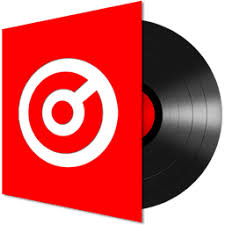
Virtual DJ is a powerful audio editor as it will provide you with the tools and options that a real DJ box will have. Though being powerful, it is easy to use. It is one of the oldest audio editors and it has a download count of 100 million. Virtual DJ is the best audio editor for Linux when it comes to library management. You can easily search for tracks, create playlists and smart folders with ease. It has AI suggestions too. In the app, you can find a lot of built-in audio and video effects to enhance your music.
It is available for Windows and Mac only. But you can install Wine on your Linux to run this editor. It costs $19 per month.
Qtractor
Qtractor is one of the fewest audio editors that is developed only for Linux OS. Until now, it is available for Linux only.

The audio editor is written in C++ with the Qt framework, hence the name Qtractor. Since it is targeted for Linux only, the navigation and UI are pretty simple to native Linux users. You can add an infinite number of music tracks to a project without any hanging issues. The supported file formats are OGG, MP3, WAV, AIFF, FLAC. If you want more, you can add them via libsndfile. It has a built-in sound mixer, MIDI clip editor, loop recorder, and many more options.
Qtractor is available for free.
Ardour
Ardour is one of the best audio editors for Linux. It gives you a pleasant audio editing experience.

With Ardour, you can get non-linear editing, mix different audio formats together, record from various sources, add unlimited multichannel tracks, and so on. Ardour is suitable for both personal and professional use. Other than the built-in plug-ins you can add plug-ins from any makers. The supported plug-in formats are OS X, VST, and LV2. The audio editor will display the frame-by-frame timeline of an audio file.
Ardour audio editor is available for free.
guitarix
guitarix is a virtual guitar amplifier for your Linux OS. If you are a guitarist, it is the best audio editor for you.

guitarix takes the audio signal from your guitar and processes them within seconds. The obtained signal from the guitar is processed by a main amp and the rack-section. In the rack-section, you can add more than 25 effects to finetune your music. The maximum time taken for processing is not more than 10 seconds. If you want more plug-ins other than the built-in plug-ins, you can add them from the LADSPA and LV2.
Like Ardour, guitarix is available for free.
ocenaudio

ocenaudio is one of the fastest audio recorders and editors for Linux. It will allow you to edit tracks without any complications.
ocenaudio is based on Ocen Framework. It will let you edit as many files as you want. The time-consuming operations like adding effects, exporting tracks, saving files will be done on the background leaving the full screen for you to edit. Advanced features like support for VST, spectrogram, multi-select mode are available on the ocenaudio. It is one of the best audio editors for beginners.
Like most of the audio editors for Linux, it is available for free.
Hydrogen Drum Machine
Hydrogen Drum Machine is a fast and intuitive audio editor for Linux. It has support for a compressed FLAC file.

With the Hydrogen Drum Machine, you can have the privilege to add an unlimited number of patterns and chain those patterns into a new track. You can add up to 192 ticks per pattern, multi-layer support for instruments, sample editor with basic functions, and advanced tab-tempo. Advanced features like JACK, ALSA, OSS audio drivers, export song to MIDI, lilypond, WAV, AIFF, FLAC, and OGG file.
Hydrogen Drum Machine is available for free.
Rosegarden
Rosegarden is yet another audio editor that is available for Linux. It is a basic audio editor.

Rosegarden has features like music notation editing, track mixing, recording, and basic support for digital audio. It is not recommended for professionals as it doesn’t have any advanced features. It is best suited for beginners who experiment with different tools and features. Rosegarden is easy to learn, thanks to the minimal number of tools. If you are eager to learn the basics of audio editing, Rosegarden is the best editor for you.
Rosegarden is available for free.
Tip! Best Text Editor for Ubuntu [Updated List]
Our opinion
These are the best audio editors for Linux OS. Install any one of these audio editors on your Linux and unleash the creative editor in you. If we missed any of your best audio editors for Linux, mention that in the comments section. Follow techowns on Facebook and Twitter to catch our latest articles instantly.
Best Audio Editors For Linux
Last updated January 16, 2019 By Ankush Das 34 Comments
You’ve got a lot of choices when it comes to audio editors for Linux. No matter whether you are a professional music producer or just learning to create awesome music, the audio editors will always come in handy.
Well, for professional-grade usage, a DAW (Digital Audio Workstation) is always recommended. However, not everyone needs all the functionalities, so you should know about some of the most simple audio editors as well.
In this article, we will talk about a couple of DAWs and basic audio editors which are available as free and open source solutions for Linux and (probably) for other operating systems.
Top Audio Editors for Linux

We will not be focusing on all the functionalities that DAWs offer – but the basic audio editing capabilities. You may still consider this as the list of best DAW for Linux.
Installation instruction: You will find all the mentioned audio editors or DAWs in your AppCenter or Software center. In case, you do not find them listed, please head to their official website for more information.
1. Audacity

Audacity is one of the most basic yet a capable audio editor available for Linux. It is a free and open-source cross-platform tool. A lot of you must be already knowing about it.
It has improved a lot when compared to the time when it started trending. I do recall that I utilized it to “try” making karaokes by removing the voice from an audio file. Well, you can still do it – but it depends.
Features:
It also supports plug-ins that include VST effects. Of course, you should not expect it to support VST Instruments.
- Live audio recording through a microphone or a mixer
- Export/Import capability supporting multiple formats and multiple files at the same time
- Plugin support: LADSPA, LV2, Nyquist, VST and Audio Unit effect plug-ins
- Easy editing with cut, paste, delete and copy functions.
- Spectogram view mode for analyzing frequencies
[irp posts=2017]
2. LMMS

LMMS is a free and open source (cross-platform) digital audio workstation. It includes all the basic audio editing functionalities along with a lot of advanced features.
You can mix sounds, arrange them, or create them using VST instruments. It does support them. Also, it comes baked in with some samples, presets, VST Instruments, and effects to get started. In addition, you also get a spectrum analyzer for some advanced audio editing.
Features:
- Note playback via MIDI
- VST Instrument support
- Native multi-sample support
- Built-in compressor, limiter, delay, reverb, distortion and bass enhancer
3. Ardour

Ardour is yet another free and open source digital audio workstation. If you have an audio interface, Ardour will support it. Of course, you can add unlimited multichannel tracks. The multichannel tracks can also be routed to different mixer tapes for the ease of editing and recording.
You can also import a video to it and edit the audio to export the whole thing. It comes with a lot of built-in plugins and supports VST plugins as well.
Features:
- Non-linear editing
- Vertical window stacking for easy navigation
- Strip silence, push-pull trimming, Rhythm Ferret for transient and note onset-based editing
4. Cecilia

Cecilia is not an ordinary audio editor application. It is meant to be used by sound designers or if you are just in the process of becoming one. It is technically an audio signal processing environment. It lets you create ear-bending sound out of them.
You get in-build modules and plugins for sound effects and synthesis. It is tailored for a specific use – if that is what you were looking for – look no further!
Features:
- Modules to achieve more (UltimateGrainer – A state-of-the-art granulation processing, RandomAccumulator – Variable speed recording accumulator,
UpDistoRes – Distortion with upsampling and resonant lowpass filter) - Automatic Saving of modulations
5. Mixxx

If you want to mix and record something while being able to have a virtual DJ tool, Mixxx would be a perfect tool. You get to know the BPM, key, and utilize the master sync feature to match the tempo and beats of a song. Also, do not forget that it is yet another free and open source application for Linux!
It supports custom DJ equipment as well. So, if you have one or a MIDI – you can record your live mixes using this tool.
Features
- Broadcast and record DJ Mixes of your song
- Ability to connect your equipment and perform live
- Key detection and BPM detection
[irp posts=10941]
6. Rosegarden

Rosegarden is yet another impressive audio editor for Linux which is free and open source. It is neither a fully featured DAW nor a basic audio editing tool. It is a mixture of both with some scaled down functionalities.
I wouldn’t recommend this for professionals but if you have a home studio or just want to experiment, this would be one of the best audio editors for Linux to have installed.
Features:
- Music notation editing
- Recording, Mixing, and samples
Wrapping Up
These are some of the best audio editors you could find out there for Linux. No matter whether you need a DAW, a cut-paste editing tool, or a basic mixing/recording audio editor, the above-mentioned tools should help you out.
Did we miss any of your favorite? Let us know about it in the comments below.
Best Audio Editing and Music Making Software for Linux
This article covers a list of music making or audio editing software usable on Linux. Some of these applications allow you to record sound streams through external devices like microphones while others allow you to capture audio from musical instruments connected to your Linux system.
Audacity
Audacity is one of the most widely used sound editing and recording software available for Linux, Windows and macOS. Audacity is completely free and anyone can access its source code repository as it is an open source software. Its main features include audio recording through microphone and other instruments, support for importing sound files, mixing and editing of audio tracks, configurable sample rates, dithering, spectrogram, respamling, built-in and third-party plugins, sequential editing, edit history, sound effects, full support for navigation through keyboard and so on. You can read more about its features, functionality and user interface elements from its manual available here.
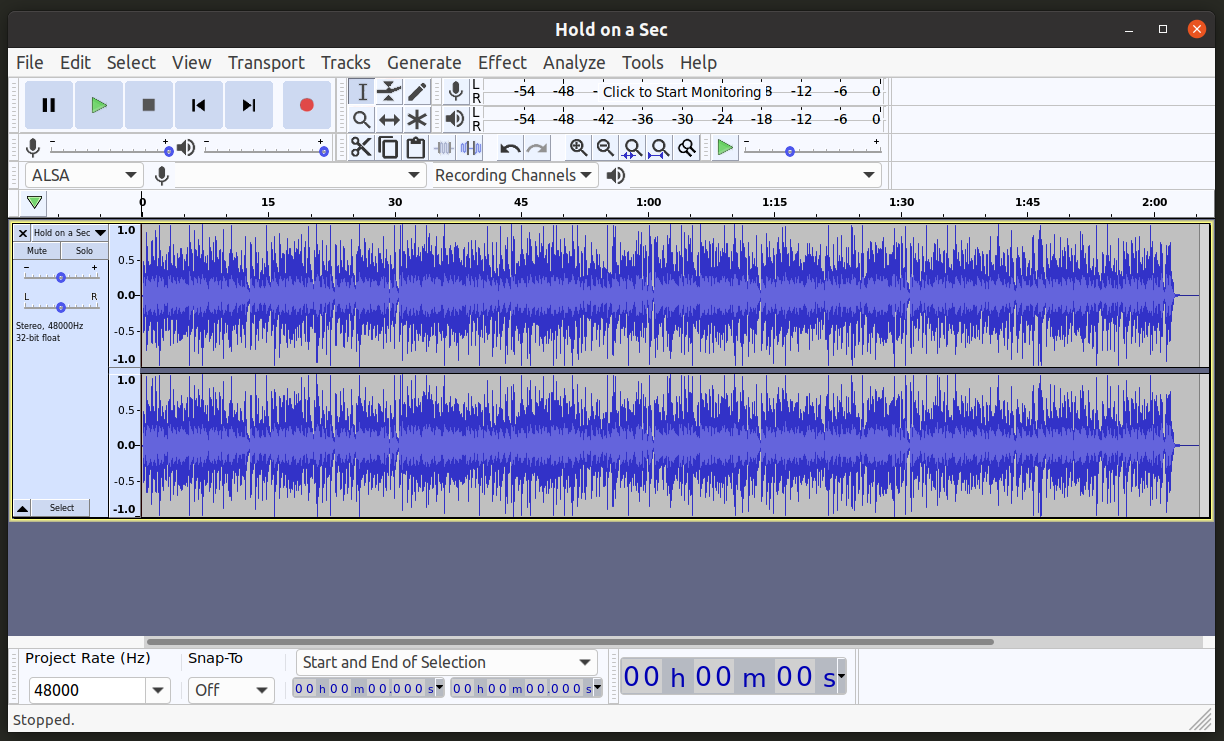
Audacity can be installed in latest versions of Ubuntu by executing the command mentioned below:
$ sudo apt install audacity
You can install the Audacity app from package manager in other Linux based distributions or you can download it from its official website.
Ardour
Ardour is a music making and recording software specially designed for engineers who regularly edit and make music. You can also use it for casual sound editing needs. Main features of Ardour include its ability to capture sound streams through microphone and other connected instruments, input monitoring, multi-layer recording mode, multi-channel and multi-layer tracks, edit history, mixing and merging of clips, support for extracting audio from video files, basic video editing tools, routing, monitor controls, official and third-party plugins, dedicated mixer strips, groups, stream panning, automation macros and so on.
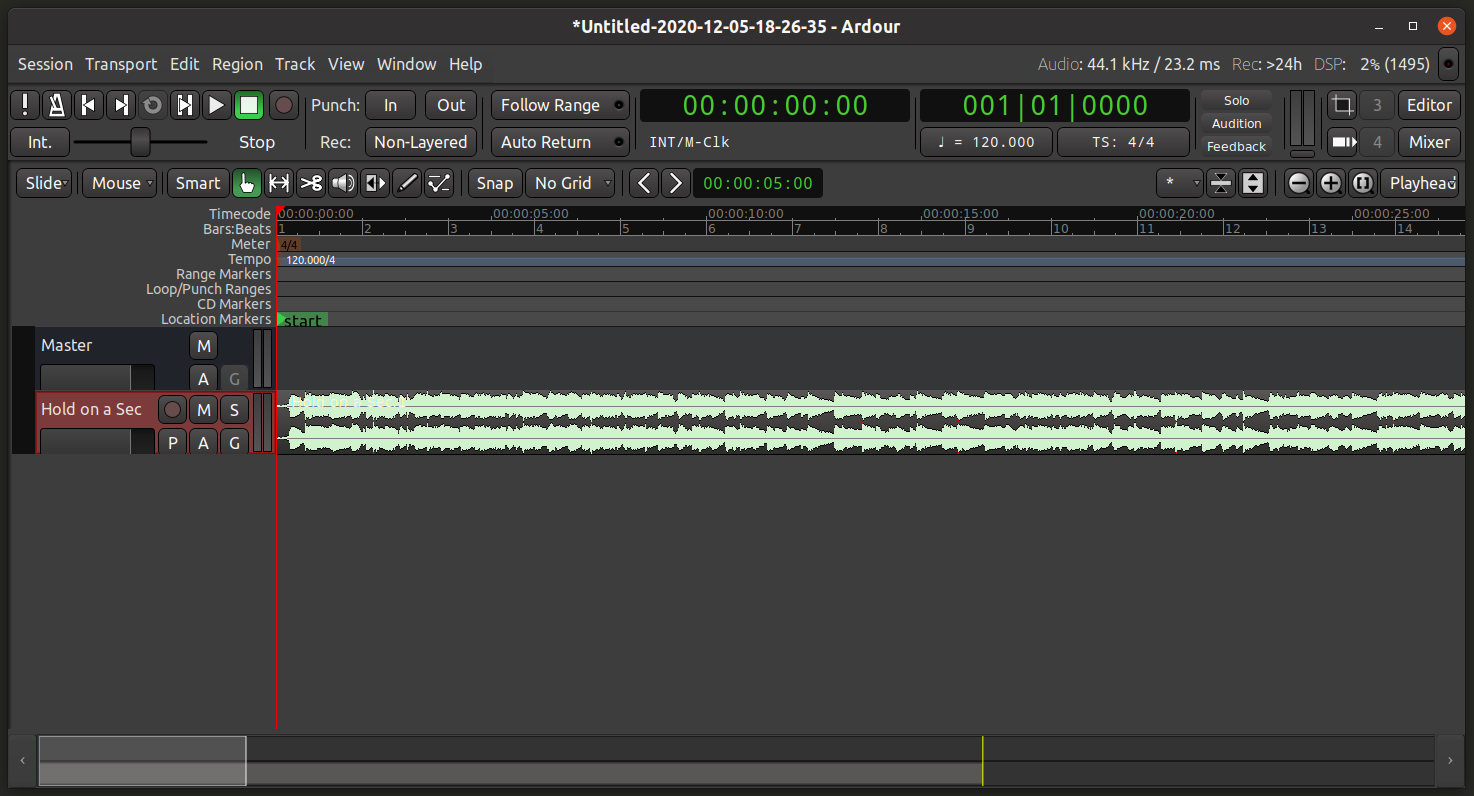
Ardour can be installed in latest versions of Ubuntu by executing the command mentioned below:
$ sudo apt install ardour
You can install Ardour app from package manager in other Linux based distributions or you can download it from its official website.
Rosegarden
Rosegarden is an open source audio sequencer, music notation creator and editor, and MIDI sequencer combined into one. It is mainly designed for editing and mixing audio recorded from musical instruments but it also works with other popular digital audio file formats. Using Rosegarden, you can compose, synthesize, arrange, edit and organize audio files and MIDI data.
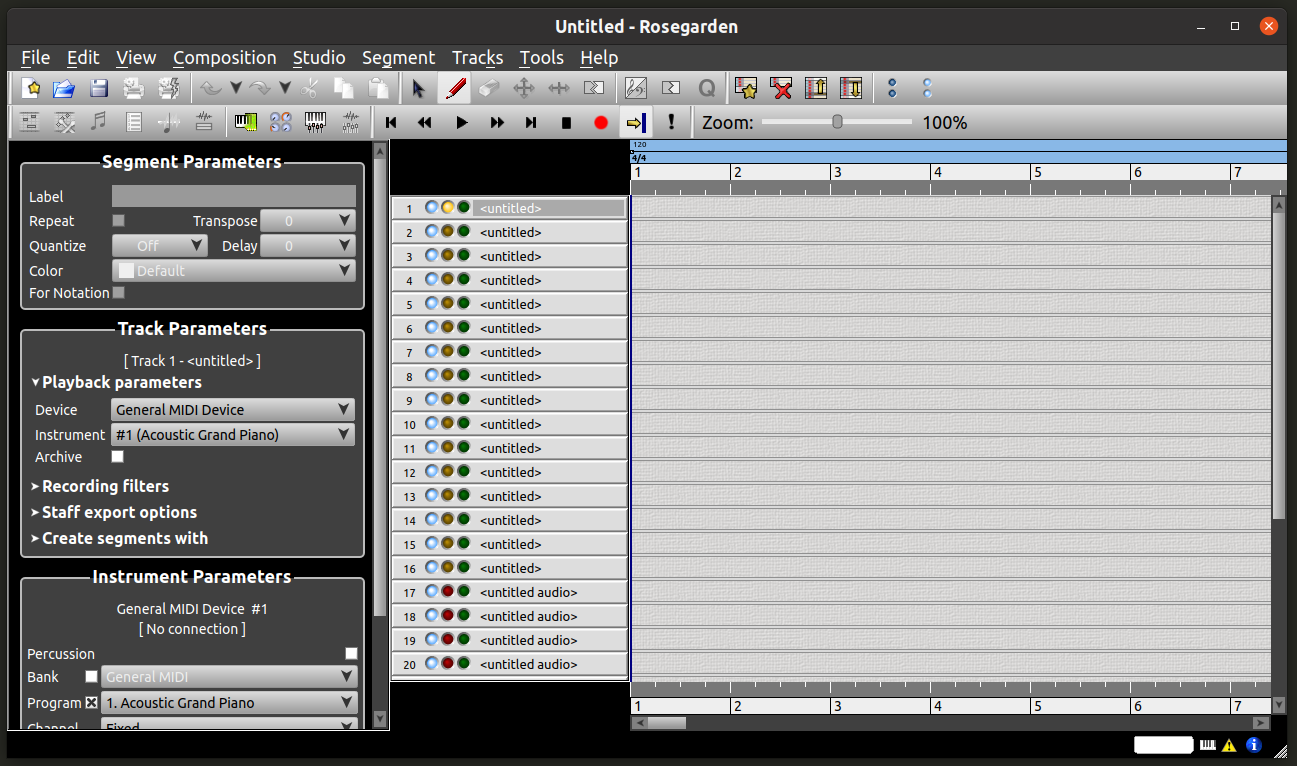
Rosegarden can be installed in latest versions of Ubuntu by executing the command mentioned below:
$ sudo apt install rosegarden
You can install the Rosegarden app from package manager in other Linux based distributions or you can download it from its official website.
LMMS
LMMS is a cross-platform and open source software mainly used for producing music. You can create new tracks, mix and synthesize sounds, rearrange clips and use layers. Other features of LMMS include support for MIDI keyboards, MIDI controls, multiple export options, beat editor, looping points, automation macros, piano roll, effects mixer, song editor, built-in presets and samples, and so on.

LMMS can be installed in latest versions of Ubuntu by executing the command mentioned below:
$ sudo apt install lmms
You can install LMMS app from package manager in other Linux based distributions or you can download the official “AppImage” file that runs on any distribution from its official website.
Mixxx
Mixxx is an open source and cross-platform DJ software that can be used to create live mixes and remixes. While it doesn’t work like other audio editors listed above, you can use it to record any live mixes created in real time. Its main mixing features include tempo control, support for external instruments, sound effects, support for controlling vinyl records, cue points, beat control, beat looping, pitch manipulation, built-in equalizer and so on.
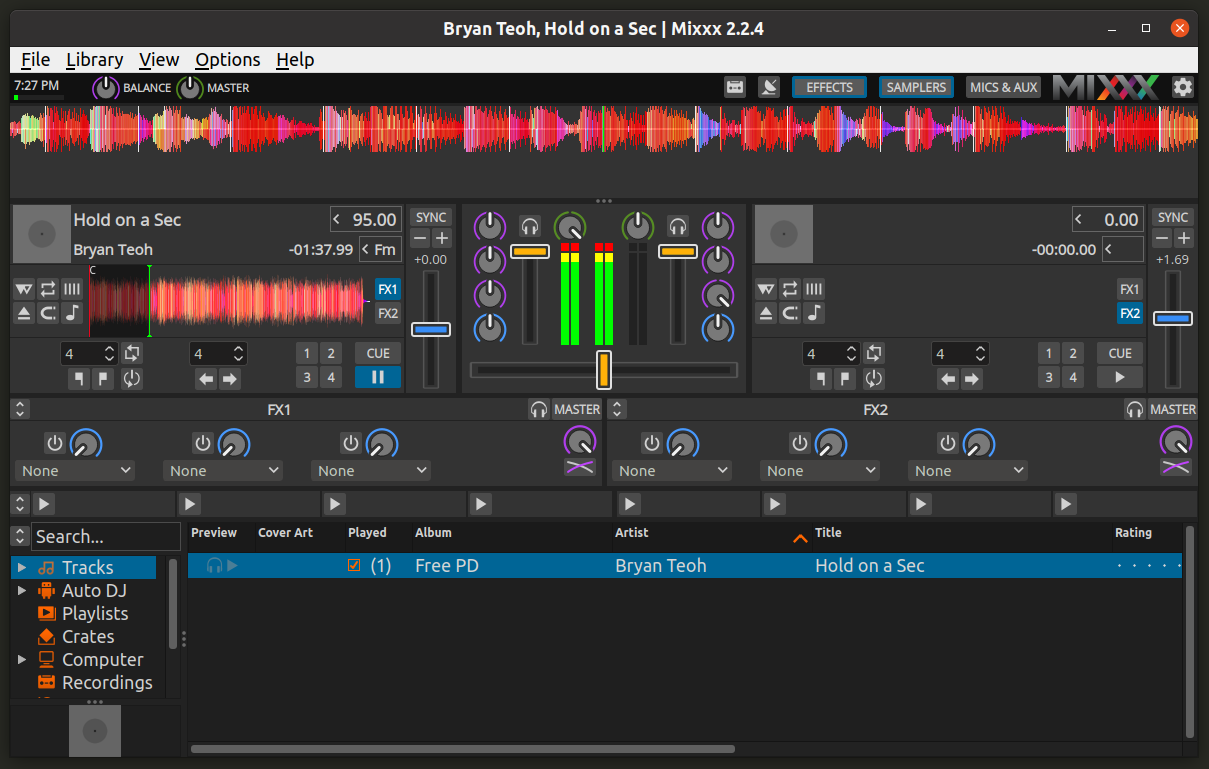
Mixxx can be installed in latest versions of Ubuntu by executing the command mentioned below:
$ sudo apt install mixxx
You can install Mixxx app from package manager in other Linux based distributions or you can download it from its official website.
Qtractor
Qtractor is an open source music making software programmed in C++ and designed using Qt toolkit. You can use it to create multi-track and multi-channel sequences of MIDI and various other sound files. Other features of Qtractor include support for mixing and editing of audio clips, edit history, drag-and-drop user interface, plugins, looped recording, crossfading tools, audio normalization, pitch and tempo manipulation, support for time-stretching, sample rate manipulation and so on.

Qtractor can be installed in latest versions of Ubuntu by executing the command mentioned below:
$ sudo apt install qtractor
You can install the Qtractor app from package manager in other Linux based distributions or you can download it from its official website.
Hydrogen
Hydrogen is an open source software that can sequence and synthesize emulated drum patterns or real sounds through external instruments. Other features of Hydrogen include multiple layers, chainable patterns of variable lengths, mixing and editing capabilities, tempo and pitch manipulation, visual metronome, time-stretch function, loop support and so on.

Hydrogen can be installed in latest versions of Ubuntu by executing the command mentioned below:
$ sudo apt install hydrogen
You can install the Hydrogen app from package manager in other Linux based distributions or you can download it from its official website.
Helm
Helm is an open source and cross-platform synthesizer that can be used to create digital music. It features multiple oscillators, waveshaping, shelf filters, arpeggiator, sound effects, step sequencer, multiple waveforms, filters and so on.
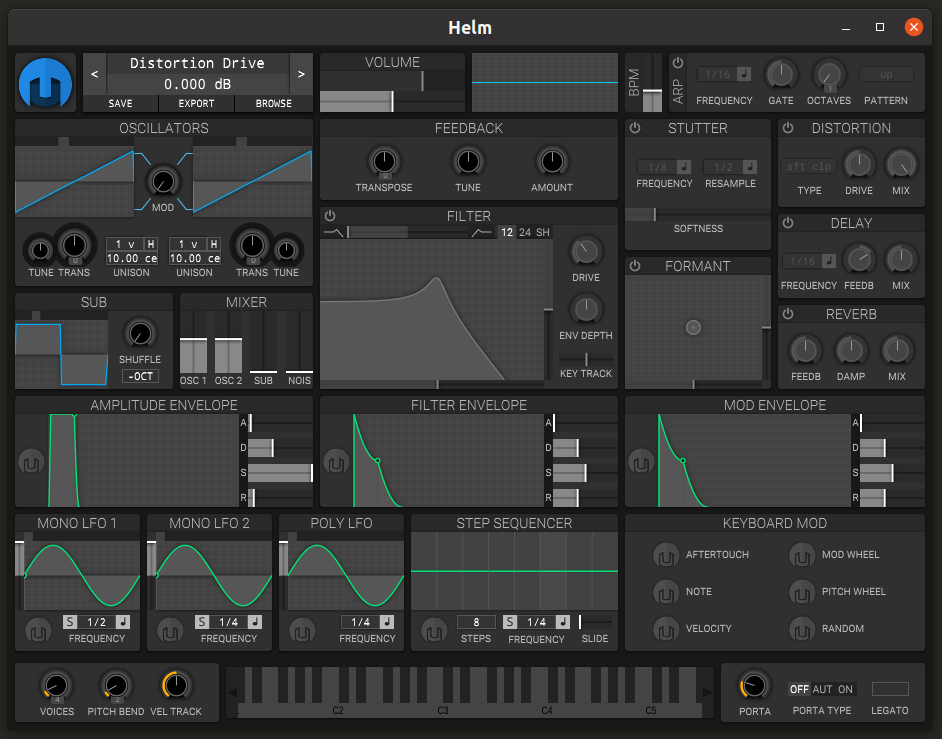
Helm can be installed in Ubuntu by downloading installable “.deb” packages available here. Once downloaded, run a command in the following format to install the “.deb” package.
$ sudo apt install ./helm_0.9.0_amd64_r.deb
You can follow instructions available here to install Helm in other Linux based distributions.
Conclusion
These are some of the best, free, and open source software that you can use to record, edit, mix, synthesize, and directly make music from scratch using external instruments connected to your Linux system.
